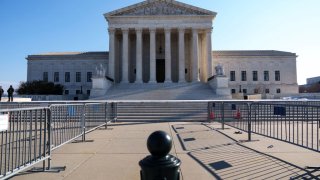
The U.S. Supreme Court building is seen January 24, 2022 in Washington, DC.
- The Supreme Court ruled that Kentucky's Republican attorney general can intervene to defend a restrictive state abortion law that had been abandoned by another government official.
- Justices in an 8-1 ruling said a lower court was wrong to deny a bid by GOP attorney general Daniel Cameron to rescue the law, which would largely ban abortions performed using a method common during second-trimester pregnancies.
- The Supreme Court has yet to rule in another case related to a Mississippi abortion law that could end long-standing abortion protections guaranteed by the Roe v. Wade ruling.
The Supreme Court ruled Thursday that Kentucky's Republican attorney general can step in to defend the state's restrictive abortion law, which had been abandoned by another top official.
Justices in an 8-1 decision said a lower federal court was wrong to deny Attorney General Daniel Cameron's effort to intervene in the case in an effort to try to save the law.
That law would largely ban abortions performed using a method common during second-trimester pregnancies.
Get top local stories in San Diego delivered to you every morning. Sign up for NBC San Diego's News Headlines newsletter.
The ruling dealt with the technical aspects of the legal battle over Kentucky's law, rather than the merits of the statute itself.
However, the decision is a setback to abortion rights supporters because it could lead to the resurrection of a law that is one of several pushed by anti-abortion advocates to further limit when women can terminate pregnancies.
And the ruling comes as the high court has yet to decide a case involving a strict Mississippi abortion law case that could end or erode long-standing abortion protections guaranteed by its landmark 1973 ruling in the Roe v. Wade case.
Money Report
Justice Samuel Alito, a conservative, wrote Thursday's opinion in the Kentucky case. Two liberal justices, Elena Kagan and Stephen Breyer, concurred with the ruling.
The sole dissent came from Justice Sonia Sotomayor, the third liberal voice on the majority-conservative bench.
The Kentucky law, which was signed in 2018, was later ruled unconstitutional by a federal district court. The state then appealed that ruling to U.S. Court of Appeals for the Sixth Circuit.
But before that court issued its decision, Kentucky elected then-Attorney General Andy Beshear, a Democrat, as its governor, while electing Cameron as AG to replace him.
The Sixth Circuit then upheld the lower court's ruling against the law.
Kentucky's health secretary afterward opted not to pursue a further appeal, effectively dooming the law from taking effect.
But Cameron tried to intervene in the case, in order to seek another appeals hearing.
However, the Sixth Circuit rejected that bid, saying Cameron's motion came too late. Cameron then asked the Supreme Court to reverse that decision.
Breyer, during oral arguments in the case in October, signaled he would side with Cameron during oral arguments last October.
"If there's no prejudice to anybody, and I can't see where there is, why can't he just come in and defend the law?" Breyer said at the time.
In the majority opinion Thursday, Alito wrote that despite Beshear becoming governor, those opposing the law in court "had no legally cognizable expectation that the [health] secretary he chose or the newly elected attorney general would" give up on defending the abortion law "before all available forms of review had been exhausted."
Sotomayor, in her dissent, wrote that the majority was "bend[ing] over backward to accommodate the attorney general's reentry into the case."
She also wrote, "I fear today's decision will open the floodgates for government officials to evade the consequences of litigation decisions made by their predecessors of different political parties, undermining finality and upsetting the settled expectations of courts, litigants, and the public alike."
Breyer is retiring this summer from the Supreme Court.
President Joe Biden has nominated Judge Ketanji Brown Jackson to replace Breyer. If she is confirmed by the Senate, Jackson would be the first Black woman on the high court.






